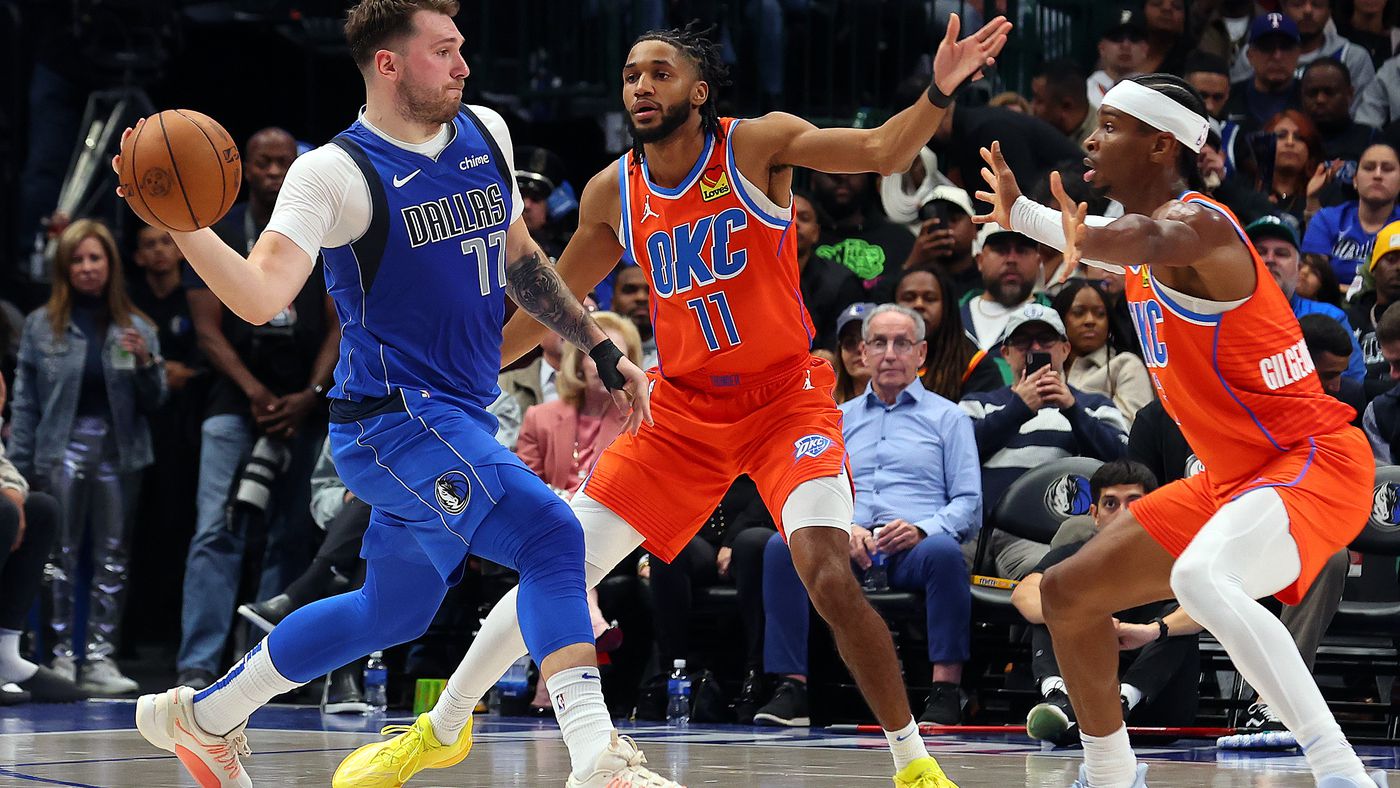The Oklahoma City Thunder and the Dallas Mavericks are two of the most dynamic teams in the NBA, each bringing its unique style and energy to the court. When these two teams meet, fans are treated to a competitive game filled with high-scoring action, spectacular plays, and intense rivalry. In this blog post, we’ll dive into the player statistics from their most recent match, providing an insightful look at how the players performed, what strategies they employed, and how these stats can shape the future matchups between these teams.
OKC Thunder’s Impressive Performance in the Match
The Oklahoma City Thunder entered the game against the Dallas Mavericks with a strong lineup, looking to capitalize on their recent improvements and momentum. Throughout the match, the Thunder displayed their typical fast-paced offense, relying heavily on ball movement and perimeter shooting. Several players stood out with their performances, and the stats paint a clear picture of how OKC dominated in certain aspects of the game.
Shai Gilgeous-Alexander, the Thunder’s star guard, was undoubtedly the leader on the floor. His ability to both score and facilitate made him a constant threat to the Mavericks’ defense. With a total of 32 points, 6 assists, and 4 rebounds, Gilgeous-Alexander was the cornerstone of Oklahoma City’s offensive success. His shooting efficiency, especially from the free-throw line and mid-range, showcased his growing offensive arsenal. Additionally, his perimeter shooting was on full display, as he drained a couple of deep 3-pointers, which helped stretch the Mavericks’ defense.
Dallas Mavericks’ Struggles to Contain Shai Gilgeous-Alexander
The Mavericks entered the game with one primary goal in mind: stopping Shai Gilgeous-Alexander. Unfortunately for Dallas, they struggled to find an answer for his offensive prowess. Despite numerous defensive rotations and switches, Gilgeous-Alexander continued to slice through their defense with ease, leaving the Mavericks scrambling. This performance illustrated a recurring issue for Dallas—lack of a consistent defensive plan against elite scoring guards. Mavericks coach Jason Kidd will likely look for ways to counter such performances in future games.
The stats also reflected Dallas’ defensive shortcomings. They allowed 32 points to Gilgeous-Alexander, with many of those points coming in crucial moments. While Luka Dončić’s defensive abilities are commendable, his team defense often comes under scrutiny, particularly when guarding fast and agile players like Shai.
Luka Dončić: A One-Man Show for the Mavericks
While the Mavericks struggled to contain the Thunder’s offense, Luka Dončić was a bright spot in the game. The 24-year-old superstar had a magnificent outing, finishing with 34 points, 8 rebounds, and 9 assists. Dončić demonstrated once again why he’s considered one of the best all-around players in the league. His ability to score from every part of the court, whether it be a pull-up jumper, deep 3-pointer, or driving layup, kept the Mavericks in the game despite their defensive issues.
Dončić’s offensive performance was matched only by his court vision. His 9 assists showed how his ability to create plays and involve teammates was a crucial element of Dallas’ offensive system. However, as the game went on, it became clear that Dončić was shouldering too much of the offensive load. The lack of significant support from his teammates hurt the Mavericks in the long run, and the Thunder were able to exploit this imbalance.
Jalen Williams’ Emerging Role for the Thunder
Another standout for the Thunder was Jalen Williams, who continues to prove his value as a versatile scorer. In this matchup, Williams finished with 18 points, 5 rebounds, and 3 assists, playing a pivotal role in the Thunder’s victory. His ability to hit outside shots and create space for himself on offense helped to balance the scoring load alongside Gilgeous-Alexander.
Williams is proving that he can be a reliable second scorer for OKC, and his stats in this game show that he’s improving every time he takes the floor. The Mavericks had trouble stopping him, especially in transition, where Williams’ speed and agility were on full display.
Mavericks’ Bench: A Tale of Inconsistency
One of the major challenges for the Dallas Mavericks in this game was the underperformance of their bench players. Unlike the Thunder, who saw contributions from several players off the bench, the Mavericks struggled to get much production from their secondary units. Tim Hardaway Jr. and Christian Wood were expected to provide scoring support, but both had lackluster performances. Hardaway finished with just 10 points, while Wood struggled to find his rhythm and only managed 7 points in limited minutes.
The stats tell the story of the Mavericks’ bench woes. The team had just 26 total bench points, which paled in comparison to the Thunder’s bench output. The Thunder’s bench players, including Isaiah Joe and Lu Dort, provided a much-needed spark, helping OKC extend their lead in the second half.
The Battle of the Bigs: Who Won the Rebounding War?
One of the key aspects of the game was the battle on the boards. Both teams feature solid big men, but it was the Thunder who ultimately gained the upper hand in rebounding. Oklahoma City grabbed a total of 48 rebounds, compared to Dallas’ 39, and this disparity was particularly noticeable on the offensive glass. The Thunder’s length and athleticism were factors that the Mavericks couldn’t overcome.
In particular, Josh Giddey’s ability to crash the boards as a guard was impressive. He finished the game with 8 rebounds, showing his all-around game that’s so vital for Oklahoma City’s success. For Dallas, the lack of rebounding from their forwards and centers was a major issue. While players like Dwight Powell and Maxi Kleber are known for their hustle, they weren’t able to match the Thunder’s intensity on the glass.
Free Throw Shooting: A Critical Factor
The free throw line was another area where the Thunder excelled. OKC made 23 of their 28 free throw attempts, a solid 82% conversion rate. This was a critical stat, as it allowed the Thunder to maintain their lead and close out the game effectively. In contrast, the Mavericks were less efficient from the free-throw line, hitting only 16 of their 22 attempts, which accounted for just 72% of their free throws.
Gilgeous-Alexander, in particular, was excellent from the line, finishing a perfect 9-for-9, adding crucial points during key moments of the game. The Mavericks’ inability to convert on free throws meant they left points on the table, which ultimately contributed to their inability to keep pace with the Thunder.
Turnovers: A Factor in the Mavericks’ Loss
Turnovers were another significant factor in the outcome of the game. The Mavericks committed 14 turnovers, which led to 16 fast-break points for the Thunder. These turnovers disrupted Dallas’ offensive flow and allowed the Thunder to exploit transition opportunities. While the Mavericks did get a few steals, they were unable to capitalize on them effectively.
On the other hand, the Thunder committed just 9 turnovers, showcasing their ability to maintain control of the ball and run a more disciplined offense. The difference in turnover margin was especially critical in the second half when the Thunder were able to push their lead to double digits, thanks to fast-break opportunities off turnovers.
Defensive Matchups
When it came to defensive matchups, the Thunder were clearly the more effective team. They did a solid job of limiting Dončić’s supporting cast, forcing players like Hardaway Jr. and Kleber into tough shots. While Dončić still managed to get his numbers, the Thunder’s defense on the perimeter was particularly impressive.
Lu Dort’s defensive prowess was on display, as he did a good job of limiting Hardaway’s impact on the game. Dort’s ability to stay in front of his man and contest shots was crucial in slowing down the Mavericks’ offensive flow. Additionally, Giddey’s length and awareness helped disrupt the Mavericks’ offensive sets, contributing to a well-rounded team defensive effort by OKC.
The Importance of Depth OKC’s Advantage
As the game wore on, it became evident that Oklahoma City’s depth was a major advantage over Dallas. While Dončić played heavy minutes, the Mavericks struggled to keep up with the Thunder’s fast-paced, high-energy style. OKC’s bench rotation provided the necessary support and allowed the starters to stay fresh, whereas the Mavericks lacked that same level of depth.
Players like Isaiah Joe and Dario Šarić contributed significant minutes, providing scoring and defense, which allowed the Thunder to maintain their intensity throughout the game. The Mavericks, meanwhile, were often forced to rely on their starting five, and fatigue began to show in the second half.
Coaching Decisions
Thunder head coach Mark Daigneault deserves credit for his excellent game plan. His rotation choices, especially with the bench, were key in maintaining the team’s energy levels. Daigneault’s decision to push the pace and keep the ball moving in transition played a significant role in wearing down the Mavericks.
On the other hand, Mavericks coach Jason Kidd struggled to find the right combinations. While he tried various lineups to slow down the Thunder, he was unable to get consistent production from his bench. Kidd’s inability to adjust defensively to OKC’s shooting and transition play ultimately sealed the Mavericks’ fate.
Key Moments that Shaped the Game
Several key moments shaped the outcome of the game. Early in the second half, the Thunder went on a 15-4 run, largely due to the stellar play of Gilgeous-Alexander and Williams. This run allowed OKC to build a lead they would not relinquish. The Mavericks couldn’t find their rhythm, and the Thunder took full advantage.
Another crucial moment came late in the fourth quarter, when the Mavericks attempted to rally. However, the Thunder’s free-throw shooting and defensive stops kept Dallas at bay, preventing any chance of a comeback.
Looking Ahead
The player stats from this game provide important insights into what both teams need to focus on for future matchups. For Oklahoma City, maintaining their defensive intensity and depth will be crucial. If Gilgeous-Alexander continues his stellar play, the Thunder will be a formidable opponent for any team in the Western Conference.
For Dallas, the focus will need to be on finding more offensive balance. While Dončić is a superstar, he can’t do it all alone. Players like Hardaway Jr. and Wood must step up, and the Mavericks will need to find a more cohesive defensive scheme to counteract dynamic players like Gilgeous-Alexander.
Conclusion
The Okc Thunder vs Dallas Mavericks Match Player Stats showcased the impressive stats and skills of some of the NBA’s best players. While both teams have their strengths, the Thunder’s depth, defensive prowess, and Shai Gilgeous-Alexander’s leadership were the key factors in securing the win. The Mavericks, while led by Luka Dončić, will need to improve their team play and find more consistency across the board to compete at a high level.
Read Also: Discovering Plessner Coaching in Lutherstraße 2 34327 körle





